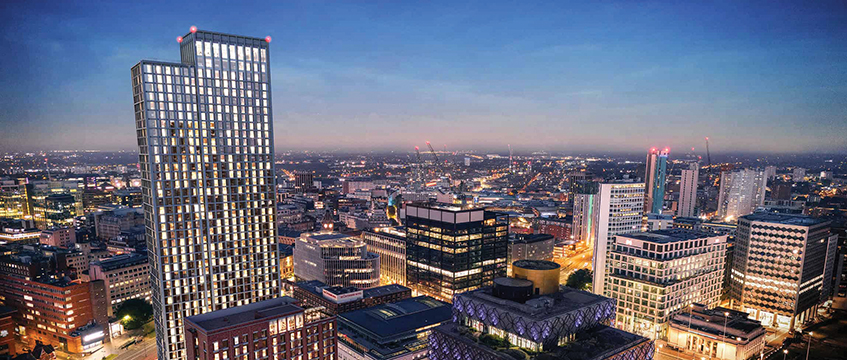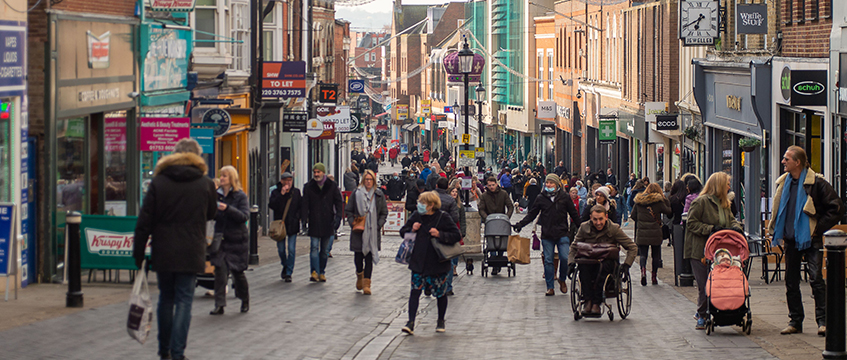At the start of 2022, it felt as if the retail sector was regrouping after two years of pandemic-led disruption. But as the year unfolded, fresh macroeconomic and geopolitical woes slowed down recovery and prevented any respite for the sector. Consumer confidence is in the doldrums as the cost-of-living crisis takes hold, bringing renewed uncertainty.
There was no let up for industrial either, with investment waning after a period of record yield compression and take-up slowing down during the year.
As 2022 nears the finish line, EG looks back at a year of ups and downs for the sectors.
Retail deals stumble
Retail investment enjoyed something of a revival early in the year, with volumes underpinned by LaSalle Investment Management’s circa £600m deal to buy McArthurGlen’s Cheshire Oaks and Swindon designer outlets from Nuveen, reflecting a 6% yield. But in the months that followed, the mood shifted as macroeconomic and political outlooks became gloomier and the cost of debt rose, leading to portfolio deals being pulled and talks stalling on shopping centre acquisitions.
Former prime minister Liz Truss and her chancellor Kwasi Kwarteng’s disastrous mini-Budget in September plunged the markets into further turmoil. In the days that followed, LXi REIT dropped a £500m sale-and-leaseback deal for 18 Sainsbury’s supermarkets.
However, as the year drew to a close, a notable retail deal was struck. In a sign of the times, the family-owned Fenwick department store on New Bond Street, W1, was sold for £430m to Lazari Investments earlier this month. The landmark premises, which has traded since 1891, will close in 2024. The store was sold with consent for a mixed-use scheme.
I don’t want candy
On nearby Oxford Street, W1, Westminster City Council took action against the plethora of American candy shops in June amid claims they had racked up a £7.9m rates bill.
After several raids on sweet and souvenir stores – with more than £200,000 of counterfeit goods seized – the council said that a third of candy stores on Oxford Street have now closed. In November, Derwent chief executive Paul Williams implored the industry to take “ambitious, bold” action to revive the street, which he described as “a bellwether for the health of the West End”.
The spotlight was also on the West End while discussions intensified over Marks & Spencer’s controversial plans to redevelop its Marble Arch flagship store. Selfridges, Ikea, New West End Company and site owner the Portman Estate were among those backing the retailer, while those providing evidence in support of campaign group Save included Tyler Goodwin, chief executive of Seaforth Land. A public inquiry into the scheme took place in October.
How the major REITs fared
Listed real estate owners began the year with confidence that the troubles of the pandemic were largely behind them. Both British Land and Landsec bounced back into the black for their respective financial years ending in March. In June, Hammerson turned a corner as chief executive Rita-Rose Gagné’s strategy began to take root.
But as the investment market headed for downturn, owners went back to the drawing board on their acquisition and disposal strategies. Landsec prepared to slow its pace of capital recycling, with disposals expected to surpass investment into new acquisitions, while British Land reiterated its aims to recycle proceeds from London office sales into retail parks and urban logistics.
Share prices at the industrial REITs, including SEGRO and Tritax Big Box, were dealt a blow in May when Amazon put the brakes on its physical expansion drive. However, industry leaders in the UK contended that the tenant base in the market was diverse enough to offset negative impact from the online giant’s shift in strategy.
Agents of change
M&A in the retail agency world saw CBRE strike a deal to acquire renowned niche agency CWM in February. Meanwhile, Harper Dennis Hobbs dropped its name and rebranded to Newmark earlier this month, following its acquisition by the US firm in 2019.
Owners rejigged their retail agency rosters over the course of the year. Those included Landsec, which whittled down its roster to five agents in May; the Crown Estate, which appointed three agencies on leasing across its London portfolio following a competitive process; and the Portman Estate, which named one sole adviser on retail, restaurant and leisure leasing across its Portman Marylebone portfolio, W1.
As the prospect of recession loomed larger in August, restaurant agent stalwart David Coffer shared his top tips with EG on how to navigate the downturn.
The last UK shopping centre?
After nearly four decades, Battersea Power Station, SW8, finally reopened to the public in October. The £9bn regeneration project has created 3.5m sq ft of commercial space and 4,239 homes, with the latter aspect garnering criticism for its lack of affordable housing. Although the industry will continue to see investment into shopping centre refurbishments, doubts remain over whether it will ever see another 1m-plus sq ft shopping centre built in the UK again.
Other eye-catching launches this year included Greggs’ flagship opening in Leicester Square, amid wider ambitions to add 150 net new stores a year until 2026, with an ultimate goal of at least 3,000. EG’s editor Samantha McClary caught up with property director Tony Rowson in October to find out more about its strategy.
Ahead of filing planning applications, the John Lewis Partnership began its search for development and investment partners in June for its first build-to-rent schemes – the first steps to realising its ambitions for a 10,000-home portfolio. It would go on to form a £500m joint venture with Abrdn this month to bring forward 1,000 homes across three BTR sites in London and the South East.
In industrial and logistics, the UK has opened its first three freeports in Plymouth and South Devon, Solent, and Teesside, after gaining final government approval in November.
Studios in focus
After years of historic highs and record-low yields, investment into industrial cooled on the back of repricing, and the overall pace of take-up significantly slowed. But some big deals were still squared away.
Among the biggest transactions this year was GIC’s £425m acquisition of a stake in North East industrial owner UK Land Estates – a deal known as Project George – marking US investor Northwood’s exit from the business in July.
Demand for film and television studio space continued apace this year, with plenty of funding and development activity while supply remained tight. In July, Blackstone and Hudson Pacific Properties won planning consent to build a 1.2m sq ft film studio in Hertfordshire, slated to open as one of the UK’s largest film and television studios by the end of 2025. The Sunset Studios jv paid £120m for the 91-acre site last year, with the complex expected to cost around £700m.
In February, LaSalle Investment Management closed a deal to fund KKR and Hondo Enterprises’ Highgate Studios acquisition and revamp in North West London, NW5, with a senior loan exceeding £100m. In the same month, Amazon’s Prime Video streaming service struck a 10-year leasing deal at Shepperton Studios in Surrey.
In October, Ryan Dean, founder of RD Group, outlined his ambition to grow his new Creative Spaces Property fund to at least £300m, potentially through the creation of a listed specialist studio REIT.
Rates – winners and losers
Those who expected November’s Autumn Statement to herald fundamental reform for business rates were left disappointed. Nonetheless, the government’s decision to freeze the business rates multiplier and abolish downwards transition in next April’s revaluation promises a boost for retail next year.
It was a decision that the likes of CBRE’s Scott Murdoch have hailed as “a massively profound advantage” for both occupiers and owners. Last month, the Valuation Office Agency signalled that rateable values at 508,300 shops will fall by 10% overall to £14.6bn upon revaluation. With these changes, retail owners could regain the upper hand in negotiations.
However, industrial owners and occupiers are set to lose out. Research by Altus showed more than 550,000 industrial properties across England and Wales will see their overall rateable values rise 27.1% – by nearly £4bn – to £18.5bn under the revaluation. The government said the revaluation aims to address the tax burden imbalance between e-commerce players and bricks-and-mortar retailers, rather than an online sales tax.
Going into 2023, there is a strong sense among the industry that retail’s rebasing before and during the Covid-19 crisis will have given the sector some solid footing, as real estate heads into a new economic age. While industrial is having to deal with a rockier price discovery process, rental growth is still on the cards on the back of a diversifying client base and ongoing squeeze in supply. Opportunities still abound, although many investors remain on the sidelines, awaiting more certainty.
To send feedback, e-mail pui-guan.man@eg.co.uk or tweet @PuiGuanM or @EGPropertyNews











